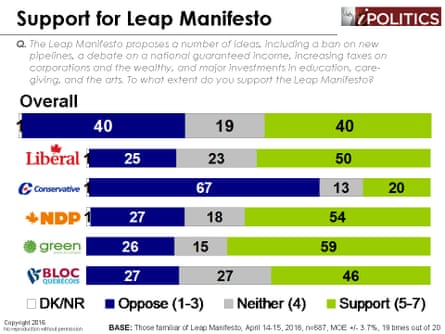For weeks, the corporate media has spouted a stern prediction: Canadians will flee in horror from the Leap Manifesto. We are a “modest shift people,” not “big shift people”. The New Democratic Party, merely by endorsing to debate the document, would court “irrelevance.”
A new poll shows just how wrong they were: far from recoiling from the Leap Manifesto, people are embracing it. Among the large and growing number of Canadians who have heard about the Leap Manifesto, half support it. That includes a majority of New Democrats and Greens, half of Liberal voters, and even twenty percent of Conservatives.
Considering the relentless smears by the media, these figures are astonishing. What they demonstrate is that Canadians are hungry for dramatic government action on climate change and inequality—and are ready to ignore the huffing and puffing of the pundits. Little wonder that not a single major outlet has reported the poll’s results.
Here’s a fact the media cannot stomach reporting: Canadians may be more in touch with the reality and implications of climate change than they are. Turns out they understand widely that the Leap Manifesto’s call for a full transition from fossil fuels to green energy by 2050 is not just based on science and technologically possible—it is necessary and beneficial.
While the media amplifies the corporate myth that we must rely on oil forever, Canadians know better: we can dramatically reduce emissions while unleashing massive amounts of jobs in renewables, energy efficient housing, public transit and in the already low-carbon teaching, health and caring sectors of the economy. And we can stop building pipelines that will lock us into escalating pollution for decades ahead.

Nor are Canadians blind to how this could be paid for. They’ve watched as Canadian banks and companies hoard billions of dollars at home or funnel them into tax-havens off-shore—a scale of private wealth that puts the lie to the notion that we must tighten our belts, allow our public services to erode, keep Indigenous peoples shackled in poverty, and treat refugees with suspicion instead of solidarity.
In their bashing of the Leap Manifesto, pundits pretend they are a class of disinterested commentators. In reality, they don’t offer observations: they control and limit the range of debate, shape and skew the political options, and deride and exclude those who try to pose an alternative.
But this is the political paradox of the climate crisis: what is feasible to the media and corporate class is catastrophic to the climate. We can break the narrowly defined box of what is considered politically possible, or we can break the ecological carrying capacity of the planet.
The poll shows that such a sensibility—an appetite for ambition and boldness instead of small steps—is quickly becoming more mainstream. Yet it remains for a political party to raise these ideas, build support, and ensure they become national policy. That is the kind of leadership Canadians want—leadership for people and the planet, not for the pundits.
No one is more oblivious to these winds of change than the corporate media. Living in a removed, self-referential realm, they are utterly out of touch with popular sentiments. If they conceive of a desire for change, it is as a dangerous menace, a primitive urge to turn back the clock, or pie-in-the-sky fantasy—all labels they have flung at the Leap Manifesto.
You can choose to believe that policies that don’t attract media tirades—more pipelines that ensure we break our climate commitments, being lax on the corporate accumulation of wealth and power—will capture the feeling of the country and reverse the NDP’s precipitous decline. But that is the real fantasy. The other option is to take the ideas that the powerful pretend are marginal—but which are in fact common-sensical and integral to a liveable environment and just society—and champion and fight for them.
It is revealing that support for the Leap vision is significant among Liberal and even Conservative voters: Canadians craving bold change could be won over to a party that can courageously advocate for it, as the NDP has done before. But only if it is loud and proud and unapologetically progressive, clearly distinguishing itself from the Liberals. The poll shows that people overwhelmingly see a role for the NDP in Canada’s political landscape: but if not as this, then what?
Because the media will do everything to suppress the rise of these ideas, the New Democrats will only succeed if they ignite and expand their base, vigorously debate and educate, and mobilize people like never before.
That kind of popular movement could change the political conversation in this country—and shift its path in a transformative direction. The media, of course, will be the last to notice.
On twitter: @Martin_Lukacs Martin was one of several authors of the Leap Manifesto (leapmanifesto.org)

Comments (…)
Sign in or create your Guardian account to join the discussion